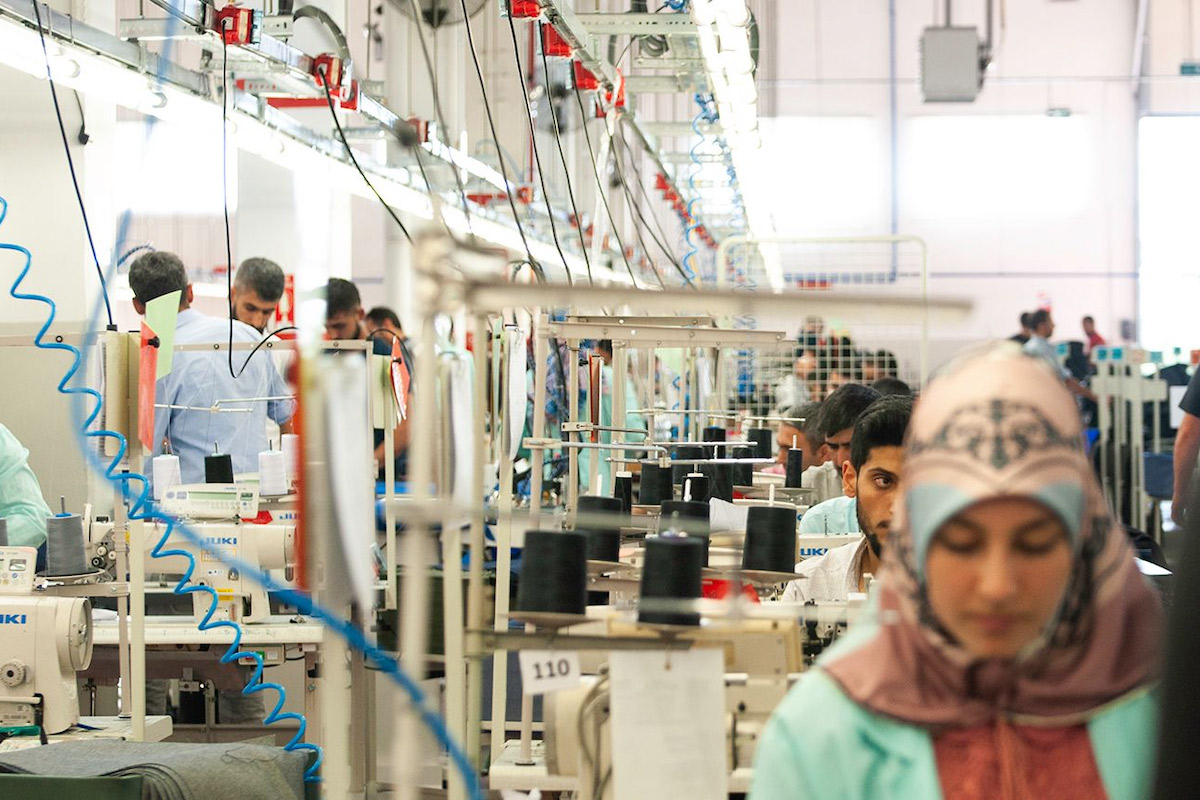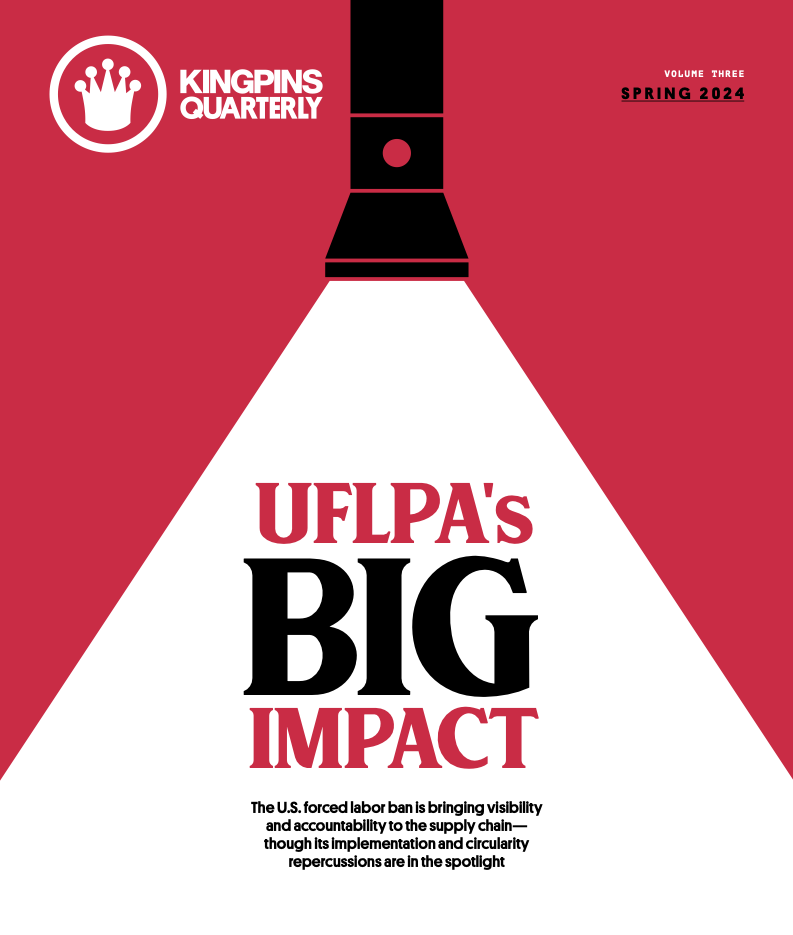Egypt’s emergence in the denim category— bolstered by infrastructure investments and trade deals—is coming at a time when other regions are struggling. Denim producers in Asia struggled amid COVID-19 challenges and Turkey continues to navigate hurdles surrounding political instability, inflation and an energy crisis exacerbated by the war in Ukraine. Egypt is taking the opportunity to shine as an affordable, geographically desirable resource with major investments supporting growth.
All that Egypt Offers
Egypt’s population totals nearly 110 million people with 60 percent between 15-64 years old. Denim producers offering relatively well-paying jobs with on-the-job training for members of this young population attract candidates who are interested in starting a career in this trade.
“Many members of the population are young,” said Emessa Denim founder Anis Trabulsi. “These are mainly machine workers. Egypt is a very appropriate country if you need this type of employment—not always a high university degree or higher. “
Emessa is a full-service operation located near Cairo Egypt’s Beni Suef Governorate, with capacity to produce 2 million pieces annually. Trabulsi noted the highest demand for his products from Egypt came during 2022 and 2023, during COVID-19 recovery.
The monthly minimum wage for these workers in Egypt’s private sector jobs rose Jan. 1 to E£ 3,500, or $113.28. Though wages are up, the value of the currency is down. The current exchange rate is E£ 30.90 for every $1.
“If you live in Sadat City, where our factory is located, it’s a very good amount because the cost of living
is not very expensive,” said Dilek Erik, marketing director for Sharabati Denim, a 46-year-old company that also provides employee benefits such as healthcare and reduced-cost housing.
Egypt’s cost of labor falls on the lower end among major denim producing countries, alongside Bangladesh, Tunisia and Pakistan. Turkey, the denim-producing country with the highest labor costs among major denim producers increased its minimum wage by 49 percent beginning Jan. 1 ₺to ₺17,002.12 or $551.88.
While Egypt-based employees can be trained to create goods that rival their counterparts in leading denim-producing countries, this evolution takes time—and money. Semih Erinc co-founded denim maker Chantuque in 2004 in Istanbul and expanded to Cairo in 2009. Erinc said the quality of products from denim mills in Turkey came as a result of a lot of investment, which Chantuque is committed to in Egypt as well. “We see Egypt as the future. Last year, we made $4 million in investments and we will invest more.” he said.
Egypt’s energy resources have also remained stable. According to Sedat Sualp, sales and marketing director at DNM DENIM Mill, Egypt’s energy independence is an asset.
“Egypt is a natural gas-producing country. It’s not obligated to import energy from other countries,” Sualp said.
Many producers in Egypt are also positioned to be ahead of sustainability goals. DNM DENIM, which has an Istanbul office and Egypt- based spinning, weaving and dyeing facilities in Damietta, Egypt, has monthly capacity for 2,700,000 meters.
“DNM DENIM Mill has already invested in solar energy panels and a co-generation facility and is able to produce its own energy,” said Sualp. The growing denim industry in Egypt allows producers to build a sustainable industry as they grow their businesses by relying on the latest clean innovations and materials.
“These factories [in Egypt] are quite new, so in terms of sustainability, development is quite conscious. As they build new, they are building in the most sustainable way,” said Erinc.
Although Egypt is centrally located to easily transport goods to Europe and the U.S., recent challenges have included attacks on ships by Houthi militants from Yemeni in the Red Sea. This threat has led some transporters to refuse routes through these regions. According to Erinc, shipments to New Jersey in the U.S. arrived from Egypt in two weeks under typical conditions, faster than goods shipped from Turkey. “At the moment, there are some rough times because of the crisis, but apart from that it is easy to find vessels to the U.S.,” said Erinc. “Egypt is good regarding transportation because of logistics where they are based geographically, the Suez Canal and the ports like Port Said and Alexandria are quite busy.”
Ongoing Challenges
Inflationary pressures have caused economic headwinds across the globe and Egypt is no exception. The country’s core inflation skyrocketed from 6.269 percent in January 2022 to 31.241 percent in January 2023.
“Egypt is not facing any other different challenges than the rest of the world,” noted Rabia Kabal who manages U.S. sales for Sharabati.
There is hope on the horizon, as core inflation consistently fell to 29 percent in January after a high of 38.1 percent in October 2023. Certain manufacturers also conduct business in a currency other than the Egyptian pound.
“As we are in the free zone, all our trade is with U.S. dollar and euro,” explained Sualp. “That’s why we are not affected by fluctuations in currency rates.”
Designated free zones in Egypt are areas within the country that allow companies to conduct business under regulations designed to promote economic growth. These considerations include special taxation, exemptions and privileges. Additionally, through the Qualifying Industrial Zones (QIZ) initiative, products exported to the U.S. from Egypt remain duty- free if the goods contain components from Israel.
The country’s geographic location is often viewed as an asset, but the Israel-Gaza conflict continues just beyond Egypt’s border. Despite the war, denim companies that operate within the North African country are confident in Egypt’s political stability. “Egypt is not ready to risk a new revolution or disorder,” said Trabulsi.
Egypt’s Denim Evolution
Continued investments by Egypt’s government and foreign investors are cultivating strong opportunities for manufacturing in the country.
In October, the Suez Canal Economic Zone (SCZONE) signed agreements with Chinese textile firms for more than $100 million in investments within Egypt’s West Qantara Industrial zone. The agreements were made ahead of Egypt’s 2024 admission into the BRICS bloc of major emerging economies including Brazil, Russia, India, China and South Africa.
Investors in the SCZONE deal included Shanghai Shengda; Zhejiang Hengsheng Dyeing and Finishing Co., Ltd.; Shengzhou Captain Industrial & Trading Co. Ltd.; Indochine Holdings Pty Ltd.; and Shaoxing Yuding Textile Co., which seeks to establish a new factory as DINGHANG Egypt Co. The factory is projected to export 90 percent of its total production to American and European markets.
“For the last five years, Egypt has made major investments in its infrastructure. New motorways, bridges, and ports have been built up, while new investments are also in works,” noted Sualp. “As a small example, 10 years ago, driving from Cairo Airport to DNM Mill took 4.5 hours, while today it just takes 2.5 hours.”
According to Erik, Sharabati is preparing to increaseits capacity to approximately 108 million meters from 100 million meters annually in Egypt where it produces denim and denim-relative nondenims in different weights and hues. Erik believes Egypt must grow on the garment-production side.
“If they have more denim garment manufacturing in Egypt, the denim fabric will be in greater demand,” explained Erik. “You get the nice denim fabric here but if the garment manufacturing is not supporting it, that is still a difficult.”
For Magdi Tolba, founder of T&C Garments, a joint venture company founded by Egyptian Tolba Group and Turkish Tay Group, one solution for growth is to invite outside investment, particularly from Turkey.
“As Turkey continues to move toward the high-tech sector, Turkey will be looking to invest in operations abroad, especially as the cost of labor continues to increase. I think it’s in the best interest for both countries to get closer,” he said, noting the strategic advantage this would create as the industry looks for options outside of Asia. “Egypt’s textile exports are modest compared to Turkey’s so it would be a win-win for Turkish companies to invest here.”




